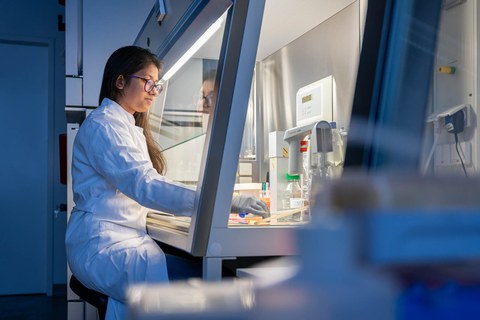Inhaltsverzeichnis
Studienvoraussetzungen
Benötigt wird:
• ein Hochschulabschluss auf ingenieurwissenschaftlichem Gebiet (vorzugsweise Materialwissenschaften, Nanotechnologie, Informatik) oder auf medizinischem Gebiet (Medizin) oder auf naturwissenschaftlichem Gebiet (vorzugsweise in Biologie, Biotechnologie, Chemie, Biochemie, Physik)
• englische Sprachkenntnisse auf dem fortgeschrittenen Niveau B2 des Gemeinsamen Europäischen Referenzrahmens für Sprachen
• gute Kenntnisse auf den Gebieten der Biochemie, Zellbiologie, Materialwissenschaften, Mathematik und Physik. Die Feststellung erfolgt ggf. durch ein Eignungsgespräch.
Eignungsfeststellungsverfahren
In diesem Studiengang ist die Teilnahme an einem Eignungsfeststellungs- bzw. Auswahlverfahren Voraussetzung für die Immatrikulation. Beachten Sie, dass die Frist zur Antragstellung ggf. vor den Bewerbungsfristen zum Studium liegen kann (s.o. unter Bewerbungsfristen). Über folgende Links erhalten Sie Hinweise zu allen innerhalb der angegebenen Frist einzureichenden Unterlagen sowie zur entsprechenden Ordnung.
- Hinweise und einzureichende Unterlagen
- Hinweise und Eignungsfeststellungsordnung auf der Seite des Studiengangs
Hinweise zur Bewerbung
Liegt zum Zeitpunkt der Antragstellung der Nachweis des ersten berufsqualifizierenden Hochschulabschlusses noch nicht vor, wird die Bewerbung auch dann berücksichtigt, wenn bereits 80 % der durch den Hochschulabschluss erreichbaren Leistungspunkte durch Bescheinigung der Herkunftshochschule (Prüfungsamt) nachgewiesen werden. Das entsprechende Formular finden Sie auf den Seiten des Immatrikulationsamtes.
Allgemeines zum Studiengang

Machen Sie sich den Übergang zu einer akademischen Karriere einfach, dank unserer Partner mit Postgraduierten Programmen wie der Dresden International Graduate School for Biomedicine und Bioengineering (DIGS-BB).
Lasst uns in den Nanobereich gehen! Auf dieser Ebene der räumlichen Auflösung treffen im 21. Jahrhundert Technologie und moderne Biologie aufeinander.
Proteine, die mächtigen Moleküle in unseren Zellen und allen Lebensformen auf der Erde, sind Nanomaschinen, die in einer genetischen Sprache codiert sind. Sie funktionieren auf einer viel kleineren Skala und mit einer größeren Effizienz als derzeit mit den verfügbaren Mikrotechnologien möglich ist. Werden Sie ein molekularer Bioingenieur:in und lernen Sie, zellulare Maschinen zu konstruieren.
Der Molecular Bioengineering Studiengang vereint eine neuartige Kombination aus Biologie, Biochemie, Biophysik, Materialwissenschaft, Medizin, Bioinformatik und Nanotechnologie.
Schließen Sie sich uns an und lernen Sie die Grundlagen der Biologie, der Biomedizin und der Bionanotechnologie kennen. Verbinden Sie Life Sciences mit Technologie. Erforschen Sie die Biologie, um zu verstehen, wie die Natur ihre mächtigen Moleküle konstruiert. Verwenden Sie Nanotechnologie und rechnergestützte Biologie, um Nanomaschinen, winzige molekulare Fabriken und Biomaterialien für medizinische und industrielle Anwendungen zu konstruieren.
Studieninhalt
Molecular Bioengineering ist ein umfassender Masterstudiengang. Über vier Semester hinweg erhalten die Studierenden eine umfangreiche Ausbildung und erwerben begehrte Laborferfahrungen.
Die ersten drei Semester sind dem Aufbau grundlegender Kenntnisse in verschiedenen Kursen gewidmet, die in zwei Kategorien fallen:
— Die biomedizinischen Module umfassen Genomik und Stammzellentechnik, Proteomik und Chemie mit Biomolekülen.
— Die technologischen Module umfassen Bioinformatik, Bionanotechnologie und Biomaterialien, Biophysik und zelluläre Maschinen.
Ab dem zweiten Semester haben die Studierenden die Möglichkeit, sich in ihren Interessensgebieten weiterzubilden, indem sie eines von zwei Wahlfächern wählen:
— Anwendung in der Biomedizin (Materialien in der Biomedizin, Biomedizinische Gewebeingenieurwesen)
— Anwendung in der Technologie (Mikrosystemtechnik, Angewandte Bionanotechnologie)
Im Verlauf des dritten Semesters haben die Studierenden die Möglichkeit, wertvolle praktische Erfahrungen in einem der Labore am CMCB, der TU Dresden oder einer Partnerinstitution zu sammeln.
Das Studium endet im vierten Semester, in dem die Masterarbeit durchgeführt wird. Die Studierenden haben die Flexibilität, aus einer Vielzahl von Forschungsthemen zu wählen und in einer der Forschungsgruppen am B CUBE, BIOTEC, oder CRTD zu arbeiten. Sie können sich auch an Gruppen anderer Abteilungen der TU Dresden oder Partnerinstitutionen wenden.
Auslandsaufenthalt
Lust auf ein Semester im Ausland? Auslandssemester, -praktika oder Sprachkurse – als Student:in profitieren Sie auf jeden Fall von einem Auslandsaufenthalt. Sie können Ihre Fach- und Sprachkenntnisse verbessern, Kontakte knüpfen, Freunde gewinnen, andere Kulturen kennenlernen und vieles mehr. Mehr Informationen gibt es auf den Seiten des International Office.
Berufsfelder
Die dynamische Entwicklung in den Life Sciences und der Biotechnologie schafft eine enorme Nachfrage nach qualifizierten Forschenden in diesen Bereichen. Absolvent:innen des Studiengangs Molecular Bioengineering sollten geeignete Positionen in Forschungsinstituten sowie in der Biotechnologie-, Pharma- und Softwareindustrie finden können.
Studiendokumente
Die Amtlichen Bekanntmachungen der TU Dresden beinhalten alle veröffentlichten Ordnungen. Benutzen Sie die Suchmöglichkeiten, um die gewünschten Dokumente zu finden: Amtliche Bekanntmachungen
Zusätzlich sind die Ordnungen auf den Webseiten der zuständigen Einrichtung auffindbar.
- Prüfungsordnung
- Studienordnung
- Eignungsfeststellungsordnung
… finden Sie auf der entsprechenden Seite der zuständigen Einrichtung.
Kontakte
Immatrikulationsamt
ServiceCenterStudium
Postanschrift:
Technische Universität Dresden
Immatrikulationsamt
01062 Dresden
- Tel.
- +49 351 463-42000
Sprechzeiten:
Center for Molecular and Cellular Bioengineering (CMCB)
Fachberater
Herr Prof. Konstantinos Anastassiadis
Center for Molecular and Cellular Bioengineering (CMCB)
Besuchsadresse:
Biotechnologisches Zentrum an der TU Dresden (BIOTEC), Tatzberg 47-49, Raum 127
Postanschrift:
TU Dresden
Center for Molecular and Cellular Bioengineering (CMCB)
Biotechnologisches Zentrum (BIOTEC)
Tatzberg 47/49
01307 Dresden
- Tel.
- +49 351 463-40127
Sprechzeiten:
Bitte Termin vereinbaren bzw. Sprechzeiten beachten.
International Office
International Office
Besuchsadresse:
Fritz-Foerster-Bau (FOE), Mommsenstr. 6, Ostflügel/1. Etage, Raum 178
Postanschrift:
TU Dresden
Internationale Office
01062 Dresden
- Tel.
- +49 351 463-42000
Sprechzeiten:
- Dienstag:
- 13:30 - 15:30
- Donnerstag:
- 13:30 - 15:30
Terminvereinbarung für die Sprechzeiten bitte über den SCS Servicepoint im Foyer!
